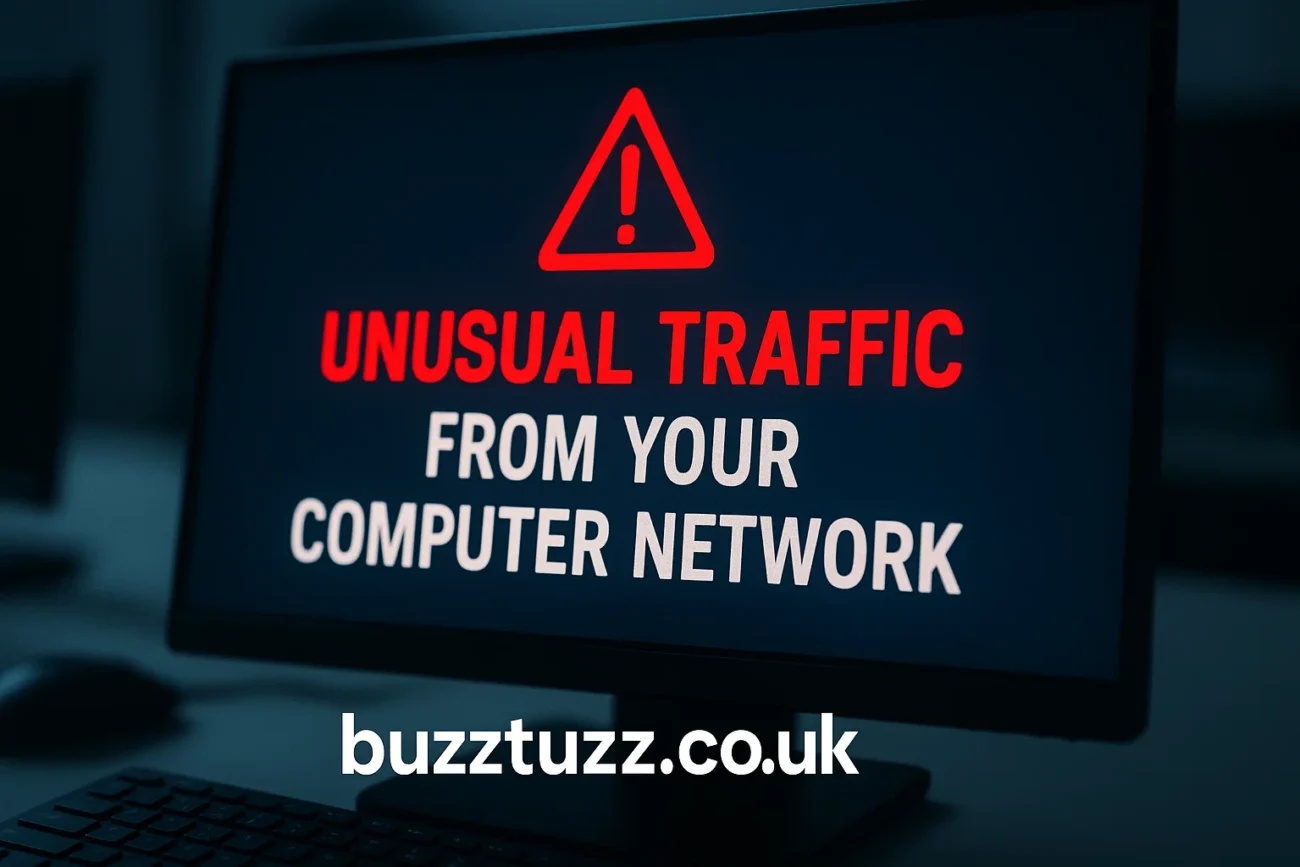Have you ever encountered the cryptic and frustrating message: “Our systems have detected unusual traffic from your computer network” while browsing Google? You’re not alone. This warning can disrupt your workflow, stall important research, and leave you confused about what triggered it. Whether you’re a casual user, a digital marketer, or an IT professional, understanding why this happens is crucial.
In this comprehensive guide, we’ll break down what this warning really means, explore the common causes behind it, and offer detailed, actionable solutions. We’ll also discuss how to prevent it from recurring, keeping your browsing seamless and secure.
What Does ‘Unusual Traffic from Your Computer Network’ Mean?
This message is a security measure employed by Google to protect its servers from automated abuse. It typically appears when a large number of requests are sent from your network within a short time.
Key Points:
- It’s not always due to malicious activity.
- It can be triggered by devices, extensions, or network behaviors.
- Google is filtering out bots from real users.
This message often includes a CAPTCHA challenge to verify you’re human. But repeated prompts suggest a deeper issue.
Top Causes of the Error
Shared IP Address or Network
Shared connections (like dorms or public Wi-Fi) can trigger Google’s defenses if another user misbehaves.
VPN or Proxy Use
Using anonymizers can raise flags, especially if many users share the same IP address.
Malware or Adware Infections
Malicious software may send automated queries or background traffic.
SEO or Scraping Tools
Automated tools for marketing or data mining may overwhelm Google’s servers.
Suspicious Browser Extensions
Extensions that run frequent background requests can be mistaken for bots.
Misconfigured Network Devices
Smart devices, outdated routers, or misconfigurations might be generating excess traffic.
Frequent Manual Queries
Rapid searches, constant refreshing, or usage of automation scripts can contribute to detection.
How to Fix the ‘Unusual Traffic’ Error Step-by-Step
Run a Full Malware Scan
Use trusted antivirus tools like:
- Malwarebytes
- Norton
- Bitdefender
Restart Your Modem or Router
Rebooting can clear sessions and refresh your IP address.
Turn Off VPNs and Proxies
Disable anonymizing tools to test if your real IP avoids detection.
Check and Remove Problematic Extensions
Turn off all browser extensions and re-enable selectively to identify the issue.
Clear Your Browser Cache and Cookies
Navigate to privacy settings and clear your browsing history, cache, and cookies.
Reduce or Limit Automated Tools
Avoid sending multiple search queries per minute; throttle automated software.
Ask Your ISP for a New IP Address
Request a dynamic or static IP to resolve reputation issues tied to your current address.
Expert Tips to Prevent the Warning in the Future
Enable Two-Factor Authentication (2FA)
Protect your credentials to avoid unauthorized background usage.
Use Premium VPN Services
Free VPNs often share IPs with hundreds of users. Premium ones offer dedicated or less-flagged addresses.
Secure All Wi-Fi-Connected Devices
Ensure routers, phones, and smart gadgets are updated and scanned regularly.
Avoid Free or Suspicious Extensions
Only install verified browser add-ons from trusted sources.
Stay Updated
Apply firmware and software patches consistently across your network.
How Google Identifies Unusual Traffic
Google’s algorithms analyze:
- Rapid query frequency
- Unusual parameters or behavior
- Simultaneous access from different devices on the same IP
They also collaborate with ISPs and track patterns to prevent abuse. Understanding this system can help you stay compliant.
Case Studies: Real-Life Scenarios and Resolutions
SEO Agency Misstep
An agency using aggressive scraping tools caused team-wide CAPTCHA errors. They reduced query frequency and moved to private proxies.
University Dormitory Woes
100+ students sharing an IP caused repeated flagging. The IT department segmented the network and added monitoring controls.
Extension Gone Rogue
A shopping plugin flooded Google Shopping API with requests. Disabling it stopped the error completely.
Infographics to Support the Content
Causes of the Error
Visual showing malware, VPNs, scraping tools, shared networks.
Step-by-Step Troubleshooting Guide
Checklist: malware scan → reboot router → disable VPN → remove extensions → clear cache.
How Google Filters Traffic
Diagram of detection logic: behavior analysis, frequency, IP tracking.
Conclusion: Regain Control Over Your Network Experience
Receiving the “unusual traffic from your computer network” warning is frustrating, but it’s solvable. With informed steps, you can identify the source, apply the fix, and strengthen your network security moving forward.
Stay proactive. Keep your systems clean, your network private, and your browsing smooth.
